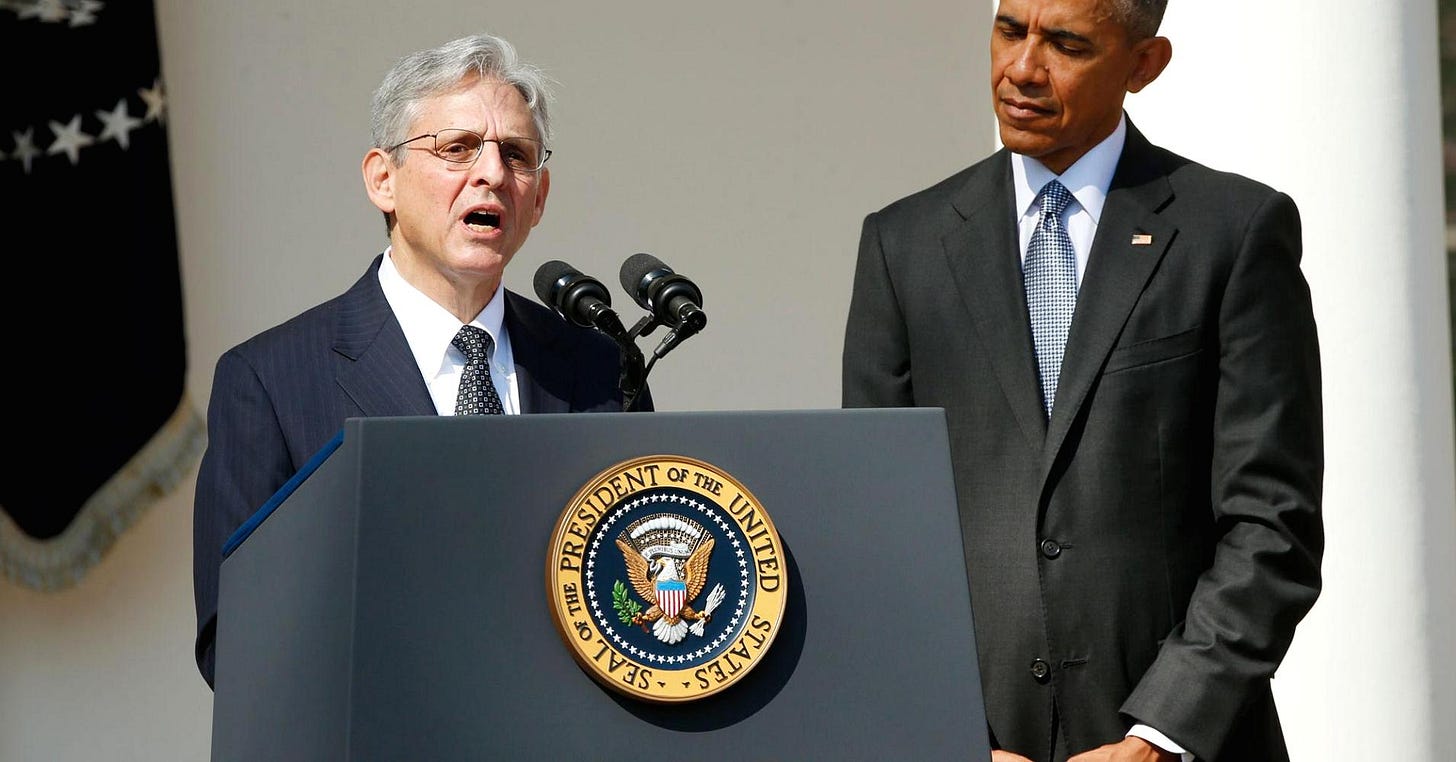The Debate over Obama's Supreme Court Nominee Begins -- Cue the Hypocrisy

As if the Republican Party didn’t have enough to worry about with Donald Trump cruising to the nomination and becoming the de facto face and voice of the GOP, now they have to contend with a soft-spoken 63-year old gray haired judge who might cost them votes in the November election.
By nominating Judge Merrick Garland to replace Justice Antonin Scalia on the Supreme Court, President Obama has put Republicans in a tough spot in this election year.
If Republicans refuse to even consider the Garland nomination they run the risk of feeding into the impression many Americans already hold of the party -- that they’re obstructionists.
If they renege on their promise to block any Obama nominee until after the November elections, they run the risk of feeding into another impression -- that they’re genetically incapable of standing up to the president.
And the president made it even more difficult for Republicans by naming Judge Garland, who is hardly a left-wing zealot, the kind Republicans could legitimately refuse to consider. Judge Anthony Napolitano, the Fox News analyst, said Garland was a center-right jurist. Perhaps a tad overblown.
"I've selected a nominee who is widely recognized not only as one of America's sharpest legal minds, but someone who brings to his work a spirit of decency, modesty, integrity, evenhandedness and excellence" the president said during a Rose Garden ceremony. "These qualities and his long commitment to public service have earned him the respect and admiration of leaders from both sides of the aisle."
And when Judge Garland spoke, one TV analyst said, he sounded like a Republican. Whether he did or not, he certainly didn’t sound like a progressive Democrat. Granted, that was probably by design. In any case, while he's no Scalia, he's no Ginsberg either, though Republicans are right to worry that he'd vote with her more than not.
Republicans almost certainly will stick to their guns and conclude that they have more to lose by considering the nomination than by blocking it. By stonewalling the nomination they will hold onto support from their conservative base, a base that fears that any pick by the president in his final months in office will tilt the Court to the left for many years to come.
Both sides will put on a straight face and say they’re acting on principle. The president arguing that the American people deserve an up or down vote on his nominee. The Republicans arguing that the voters should have their say in November before any nominee is given a hearing.
But what passes for principle in Washington is often nothing more than hypocrisy all dolled up.
So let’s not be naïve. If the tables were turned Democrats would do precisely what Republicans are doing. In fact, they already have done precisely what the Republicans are doing.
As a senator more than two decades ago, Vice President Biden argued that President George Bush should delay filling a Supreme Court vacancy, should one arise, until the presidential election was over. Biden said at the time that it was “essential” that the Senate refuse to confirm any GOP nominee to the court until then.
As the New York Times put it, “Mr. Biden’s words, though uttered long ago, are a direct contradiction to President Obama’s position in the battle over naming a successor to Justice Antonin Scalia.”
I’m sure you’re shocked.
And upon hearing that Republicans would not consider any Obama nomination to the Court, Democratic Senator Chuck Schumer said: “When you go right off the bat and say, ‘I don’t care who he nominates, I am going to oppose him,’ that’s not going to fly.”
In July, 2007, when George Bush was still president, the same Chuck Schumer said if any new Supreme Court vacancies opened up, Democrats should not allow Bush the chance to fill it “except in extraordinary circumstances.”
“The Supreme Court is dangerously out of balance,” Schumer said. “We cannot afford to see Justice Stevens replaced by another Roberts, or Justice Ginsburg by another Alito.”
When Schumer made those remarks in 2007, Mr. Bush had about seven more months remaining in his presidential term than Mr. Obama has remaining in his.
Hypocritical? Sure. But in politics no one party has a monopoly on hypocrisy.
Back in 2007, Mr. Bush’s Press Secretary Dana Perino said Schumer’s statement showed “a tremendous disrespect for the Constitution” and amounted to “blind obstructionism.”
Are you following this?
A year earlier, in 2006, then Senator Barack Obama joined in a filibuster to block the nomination of Samuel Alito to the Supreme Court, telling ABC News that he supported the filibuster "because I think Judge Alito, in fact, is somebody who is contrary to core American values, not just liberal values."
This year, the president through his spokesman, conveniently said he regretted his decision. Sure.
And if President Mitt Romney were in the White House, do you think Mitch McConnell would hold up his nominee until after the election? Sorry I asked.
The banker and financier J.P. Morgan, a keen observer of human nature, once said that “A man generally has two reasons for doing a thing: one that sounds good, and a real one.” He wasn’t talking about today’s Democrats and Republicans and their need to put lipstick on their hypocrisy and call it principle. But he might as well have been.


